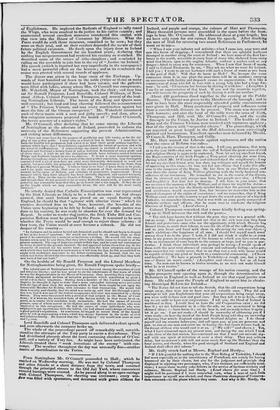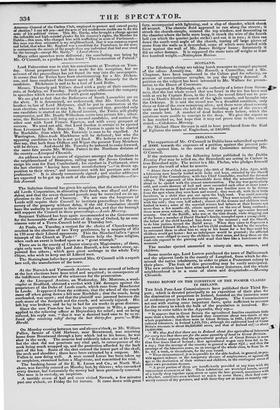From Nottingham Mr. O'Connell proceeded to Hull ; which he
reached on Wednesday morning. He was met by Colonel Thompson and other friends at a short distance from the town, and escorted through the principal streets to the Old Jail Yard, where convenient covered hustings were erected. As he passed along in an open carnage With Colonel Thompson, the cheering was incessant; every win5low was filled with spectators, and decorated with green ribbons for Ireland, and purple arid orange, the colours of Hutt and Thompson. Many thousand persons were assembled in the space before the hustings to hear Mr. O'Connell. He addressed them at great length ; but we have only room for one extract from his speech. After thanking the men of Hull for returning two sound Reformers to Parliament, he went on to say " When I saw your industry and activity—when I came into your town and saw this forest of shipping--1 retnembered that there are splendid harbours thronged in number along the coast of Ireland : we have some of the first bars hours in the world, accessible at every hour of every tide, sheltered front every wind that blows, open to the mighty Atlantic, without a sunken rock or any danger—fitted in every way for commerce. When J saw that forest 1,f masts, I said to Colonel Thompson, by me, ' They ask me what we want for Ireland. I tell you ; I want to see our harbours with such a forest of masts as you have in the port of Hull.' Will that do harm to Hull ? No, because the more commerce there is in one place the more there will be in another ; carrying on commerce with facility and despatch causes its augmentation. It is like a countryman of mine who fell in love with a young lady who had a large fortune : he said, ' I'll increase her fortune by sharing it with her.' (Laughter.) I ant for an augmentation of that kind. If you wed the countries together, you will increase the prosperity of each by sharing it with one another." About 430 gentlemen dined together in the evening at the Public Rooms. 'Phe dinner was given to the Members of the borough ; and is said to have been the most respectably attended public entertainment ever given in Hull. Many gentlemen of property and influence came from a considerable distance to be present. The room was decorated with banners ; and over the head of the table were the arms of Hutt, Thompson, and Hill, with Mr. O'Connell's crest, and the motto " Strength to the Union, by Justice to Ireland." The health% of the King and the Princess Victoria were received with rapturous applause; that of the Queen with "respectful silence." The proceedings, which are reported at great length in the Hull Advertiser, were exceedingly spirited and harmonious. Excellent speeches were delivered by Messrs. O'Connell, Hutt, Thompson, and Gully.
Mr. Hutt warned the Liberals against supineness, and the notion that the cause of Reform was safe
" I tell you the reverse of that is the case. I tell you, gentlemen, that now, as in the year 1689—that now upon the soil of Ireland the great cause of civil and religious liberty is again to be contested. Now, let not niy excellent friend, the Representative of the Irish People—( Very great cheering for some time, during which Mr. O'Connell rose and acknowledged the compliment)—I say let nut toy excellent ft iend, who has done my colleague and myself the honour of appearing in this room—let him not feel any offence that I make this allusion to the conqueror of the Boyne. He has been in our Market place, and seen there the statue of King William glittering with the lately. bestowed mu. nificence of our townsmen. He remarked to me in the course of the dinner, that he observed not only orange-men here, but purple. men also. ( Cheers and laughter.) Let him feel no dismay. I tell him, in your name, that we reverenee the memory of King William, and at times we regild his statue— not because we see in him the bloody-minded bigot that the grossest ignorance and intoleranee would reores.ent him, but because we remember him as the blessed champion of the rights of conscience ; and we remember, that if King William 1.1111C over to this country to put down the armed minions of a bigoted Catholic, we remember likewise, that it was with an army partly composed of Catholic soldiers 111111 officers, that he catne over to vindicate the religious liberties of England." (Loud cheers.) Colonel Thompson remarked, that a mote kindly feeling was springing up in Hull between the rich and the poor— The rich have known that without the poor they were as a general without an army. The poor have found out that in the rich men now they have friends and protectors—men who use the opportunity with which Heaven has blessed them, to smith their labour, to ease the ills of life of the suffering classes, and to join heart and hand with them in advancing the only true object ef man's ambition—the happiness of all men. 1 should feel myself much motet uneasy than I do in the place 'I hold, if I did not think it miglit be at some time in my power, in consequence of the honour to which you have raised me, to be an instrument of some benefit to the country at large, and to you in particular. I think those individuals may perhaps be wrong—I would speak of them with the tnust total absence of rancour and unfriendly feeling—who perhaps somewhat too rashly avow, that in me they saw a man who never would be capable of doing any good or bentfit to a commercial community. (Cheers and laughter.) We have a proverb in Yorkshire—a rough one, but a true one—. Hurry no man's cattle.' (Laughter and cheers.) Let us all have time. No man can be known in twelve months, as no man can make himself what he is in twelve."
Mr. O'Connell spoke of the wrongs of his native country, and the bright prospects now opening upon it, through the determination of Retonners in England as well as Ireland to see that equal justice was done. He called upon the People of England to assist hhn in obtaining Alunicipal Rebrin for Ireland " The Tories did not dare to tell the Scotch, that the old corporations being swept away, they were not to have new and valuable ones. They did not attempt to tell you Englishmen that your old corporations being swept away, you were unfit to have new and good ones. But they tell it to us It ish,—they say we are unfit to have new corporations. I tell you, the blood of Ireland is maddened at that. I could bear to have the old Corporations exist ; we did bear it ; we are habituated to it —like the eels, we are accustomed to being skinned alive; e t have borne it ; we do bear it, and are ready to bear it again ; let it go on. 1 am not ready—I should be unworthy of addressing you if I were ready—to bear the insult of the Irish People being told they are unworthy of having that which England enjoys and Scotland delights in. I do throw myself and my country before you, and call upon you, as you are genei oils and just, to rise as one man and assist me in having this foul insult thrown back in the throat of those who would cast it at us. (.. We will/ " and cheers.) Yes, what I have witnessed upon my present tour, and during the one which I took at the close of the last session, has convinced me that I need net animate myself with any spirit of irritation at even a short delay. They may achieve delay, but to-morrow's side will not more surely lbw up the Humber than the hour arrive, and shortly, when the good strength of Scotland and England and Ireland shall effect this reform."
Mr. Gully struck hard at Messrs. Raphael and Hardy " If I felt grateful for nothing else to the West Riding of Yorkshire, I should feel most especially so to the constituency of Pontefract, not merely for having honoured me by their choice, hut also for the judgment and principle they displayed in rejecting two personages, who, if not etniment. are sufficiently nous. rious; I mean those worthy yoke-fellows in the service of factious trickery and calumny, Messrs. Raphael and Hardy. (Loud cheers for some time.) I might well be pardoned if I were somewhat vain, when a man of such little importance as myself was elected, and these illustrious champions of Conservatism returned—to the places whence they came. And why is Mr. Hardy, the Attorney-General of the Carlton Club, employed to protect and extend purity of election? I Can tell you—and the acts of his confederate enable me to fix the scale of his political virtue. This Mr. Hardy, who brought a charge against the inflexible and high-minded pleader for his country's rights, the Member for Dublin—this man, who charged him with trafficking in seats of Parliament— this man was thus estimated in my neighbourhocd, that it was common report and belief, that when Mr. Raphael was a candidate for Pontefract, he did more to contaminate the morals of the people than any individual that had ever stood for the borough—except Mr. Hardy." (Loud cheers.)
Many other speeches were delivered ; the concluding one being by Mr. O'Connell, as a preface to the toast "The restoration of Poland."



























 Previous page
Previous page